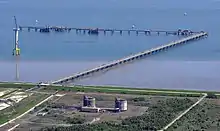
Wilhelmshaven LNG terminal is Germany's first liquefied natural gas (LNG) shipping terminal, situated near Wilhelmshaven, Germany on the North Sea. It had been in the planning stages since the mid-2010s, and in 2022 gained rapid regulatory authority approval for construction following the Russian invasion of Ukraine and the global natural gas supply crisis.
The terminal was opened on 17 December 2022 with 165 thousand cubic metres (5.8 million cubic feet) of LNG imported from Sagunto[1][2] following completion of construction in November 2022.[3]
The terminal received its commissioning load of LNG in December 2022,[4] slightly ahead of schedule which had been January 2023.[5][6]
History
Planning began for the LNG shipping terminal as early as 2017,[7] but regulatory process and political opposition resulted in years of delays in preparing German capacity to import large quantities of natural gas from seaborne LNG shipments.[6][8] The German government instead embarked on a path of using cheaper Russian natural gas commitments via the Nord Stream 1 and Nord Stream 2 undersea Baltic pipelines.[8]
As a result, construction of the Wilhemshaven terminal to receive LNG operationally did not begin until 2022.[5] Three days after the start of the Russian invasion on 24 February, German Chancellor Olaf Scholz announced that Germany would build two LNG terminals quickly, one at Brunsbüttel and another at Wilhelmshaven.[6] By August 2022, the German government had expanded their plans to include five floating LNG facilities.[5] In addition to Wilhelmshaven and Brunsbüttel,[9] which could become operational in late 2022, three more new terminals were accelerated, one at Stade and two at Lubmin, with all three expected to become operational in 2023.[10] By mid-September 2022, the German government was continuing to estimate as good the probability of getting the first two of the floating terminals into operation by late December.[11]
Unusually, environmental impact assessments were explicitly skipped according to Robert Habeck, a Green party politician and the environmental affairs minister in the current German government, saying "ensuring Germany was no longer blackmailable by Putin had to take priority."[5]
The first load of 170,000 cubic meters of LNG (97 million cubic meters of natural gas; sufficient to supply 50,000 German households for a year) arrived at the Wilhelmshaven terminal in mid-December to initiate the commissioning process of the terminal. The shipment of US natural gas had been loaded at the Venture Global LNG terminal at Calcasieu Pass, Louisiana.[4] Germany is continuing the move into marine LNG energy supply. A second of the rushed LNG gas terminals was opened by Germany at Lubmin on the Baltic Sea in mid-January 2023,[12] while the regasification ship for the LNG terminal at Brunsbüttel on the North Sea arrived on 20 January.[13]
Description
The Wilhemshaven terminal will be sized initially to receive approximately 80 tankers a year, which could substitute up to half of the gas imports that the German energy company Uniper formerly imported from Russia. This could supply approximately eight per cent of German gas demand as of early 2023.[5]
As of August 2022, the German government has leased Höegh Esperanza, a 300-metre-long (980-foot) tanker converted into a floating storage and regasification unit, and will be paying €200,000 a day for the lease. The unit will dock at a jetty built in 1982, and will turn liquid back into gas at a high rate, requiring about 10 hours per tanker load.[5]
See also
References
- ↑ "Germany's Wilhelmshaven FSRU terminal gets another US LNG cargo". LNGPrime. 24 January 2023. Retrieved 8 May 2023.
Prior to arriving in Wilhelmshaven, the FSRU took a cargo in Spain at the Saggas regasification plant in Sagunto operated by Enagas
- ↑ "Erstes LNG-Terminal in Deutschland eröffnet" [First LNG-Terminal opened in Germany]. Zeit Online (in German). 17 December 2022. Archived from the original on 17 December 2022. Retrieved 17 December 2022.
In Wilhelmshaven ist Deutschlands erstes Importterminal für Flüssigerdgas (LNG) eröffnet worden. [...] 'Der 17. Dezember 2022 ist ein wirklich guter Tag für unser Land. Denn mit dem heutigen Tag werden Deutschland und die EU ein großes Stück sicherer und unabhängiger', sagte [Bundeskanzler Olaf] Scholz.
- ↑ Eckert, Vera (15 November 2022). "Germany completes Wilhelmshaven floating LNG terminal, more to come". Reuters. Retrieved 19 November 2022.
- 1 2 Germany Welcomes First LNG Carrier At New Wilhelmshaven Terminal, OilPrice.com, 3 January 2023.
- 1 2 3 4 5 6 Oltermann, Philip (19 August 2022). "'We got too comfortable': the race to build an LNG terminal in north Germany". The Guardian. Archived from the original on 6 October 2022. Retrieved 8 October 2022.
- 1 2 3 Gehrke, Laurenz (27 February 2022). "Germany to upgrade two ports 'quickly' to receive shipped gas". Politico. Archived from the original on 24 September 2022. Retrieved 8 August 2022.
- ↑ "Zeitung: LNG-Terminal in Wilhelmshaven wieder in Planung". Gas-Magazin (in German). Berlin. 20 October 2015. Archived from the original on 3 August 2017. Retrieved 9 August 2022.
- 1 2 Deutsche Welle (27 February 2020). "German LNG terminal plans and environmentalists". Market Express. Archived from the original on 25 September 2022. Retrieved 8 October 2022.
- ↑ "Germany to fast-track two new LNG terminals". Tank Storage Magazine. 28 February 2022. Archived from the original on 13 September 2022. Retrieved 8 October 2022.
- ↑ "Germany says fifth floating LNG terminal to be built by end of 2022". Reuters. 19 July 2022. Archived from the original on 24 September 2022. Retrieved 24 September 2022.
- ↑ "Germany to sign LNG contracts in UAE, German economy minister says". Reuters. 19 September 2022. Archived from the original on 24 September 2022. Retrieved 8 October 2022.
- ↑ Germany opens its 2nd liquefied natural gas terminal, ABC News, 14 January 2023.
- ↑ Third floating LNG terminal arrives in northern Germany, DW–South Africa, 20 January 2023.
![]() Media related to LNG-Terminal Wilhelmshaven at Wikimedia Commons
Media related to LNG-Terminal Wilhelmshaven at Wikimedia Commons